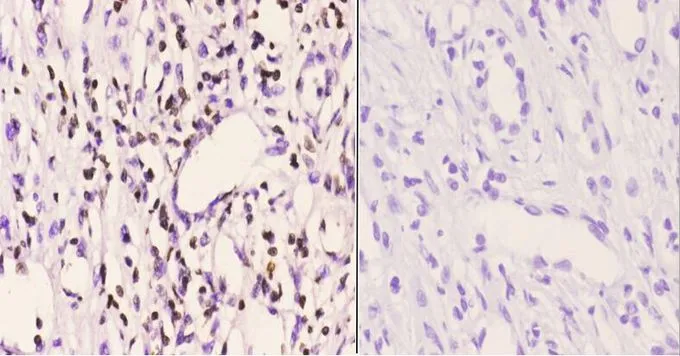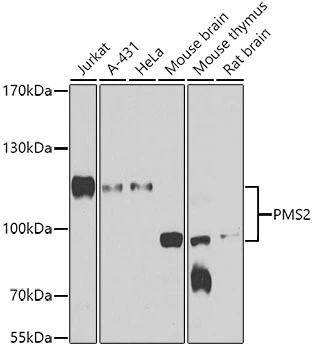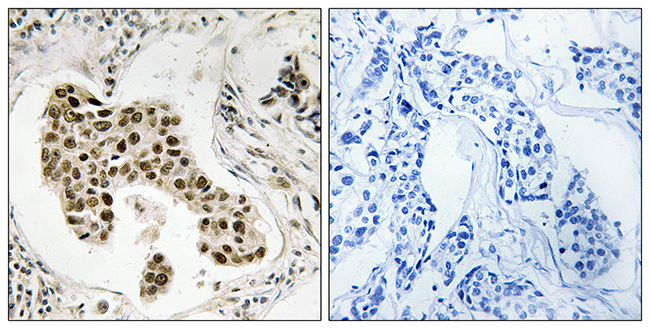![IHC-P analysis of human colon adenocacinoma tissue section using GTX03301 PMS2 antibody [A16-4]. IHC-P analysis of human colon adenocacinoma tissue section using GTX03301 PMS2 antibody [A16-4].](https://www.genetex.com/upload/website/prouct_img/normal/GTX03301/GTX03301_IHC-P_1_w_23053123_636.webp)
IHC-P analysis of human colon adenocacinoma tissue section using GTX03301 PMS2 antibody [A16-4].
PMS2 antibody [A16-4]
GTX03301
ApplicationsImmunoHistoChemistry, ImmunoHistoChemistry Paraffin
Product group Antibodies
ReactivityHuman
TargetPMS2
Overview
- SupplierGeneTex
- Product NamePMS2 antibody [A16-4]
- Delivery Days Customer9
- Application Supplier NoteIHC-P: Prediluted. *Optimal dilutions/concentrations should be determined by the researcher.Not tested in other applications.
- ApplicationsImmunoHistoChemistry, ImmunoHistoChemistry Paraffin
- CertificationResearch Use Only
- ClonalityMonoclonal
- Clone IDA16-4
- ConjugateUnconjugated
- Gene ID5395
- Target namePMS2
- Target descriptionPMS1 homolog 2, mismatch repair system component
- Target synonymsHNPCC4, LYNCH4, MLH4, MMRCS4, PMS-2, PMS2CL, PMSL2, mismatch repair endonuclease PMS2, DNA mismatch repair protein PMS2, PMS1 homolog 2, mismatch repair protein, PMS1 protein homolog 2, PMS2 postmeiotic segregation increased 2
- HostMouse
- IsotypeIgG1
- Protein IDP54278
- Protein NameMismatch repair endonuclease PMS2
- Scientific DescriptionThe protein encoded by this gene is a key component of the mismatch repair system that functions to correct DNA mismatches and small insertions and deletions that can occur during DNA replication and homologous recombination. This protein forms heterodimers with the gene product of the mutL homolog 1 (MLH1) gene to form the MutL-alpha heterodimer. The MutL-alpha heterodimer possesses an endonucleolytic activity that is activated following recognition of mismatches and insertion/deletion loops by the MutS-alpha and MutS-beta heterodimers, and is necessary for removal of the mismatched DNA. There is a DQHA(X)2E(X)4E motif found at the C-terminus of the protein encoded by this gene that forms part of the active site of the nuclease. Mutations in this gene have been associated with hereditary nonpolyposis colorectal cancer (HNPCC; also known as Lynch syndrome) and Turcot syndrome. [provided by RefSeq, Apr 2016]
- ReactivityHuman
- Storage Instruction2°C to 8°C
- UNSPSC12352203

![IHC-P analysis of human duodenum tissue using GTX57194 PMS2 antibody [IHC412]](https://www.genetex.com/upload/website/prouct_img/normal/GTX57194/GTX57194_20180619_IHC-P_w_23061123_316.webp)

![WB analysis of NIH-3T3 cell lysate using GTX13900 PMS2 antibody [163C1251]. Dilution : 2 microg/ml](https://www.genetex.com/upload/website/prouct_img/normal/GTX13900/GTX13900_1062_WB_w_23060620_935.webp)

